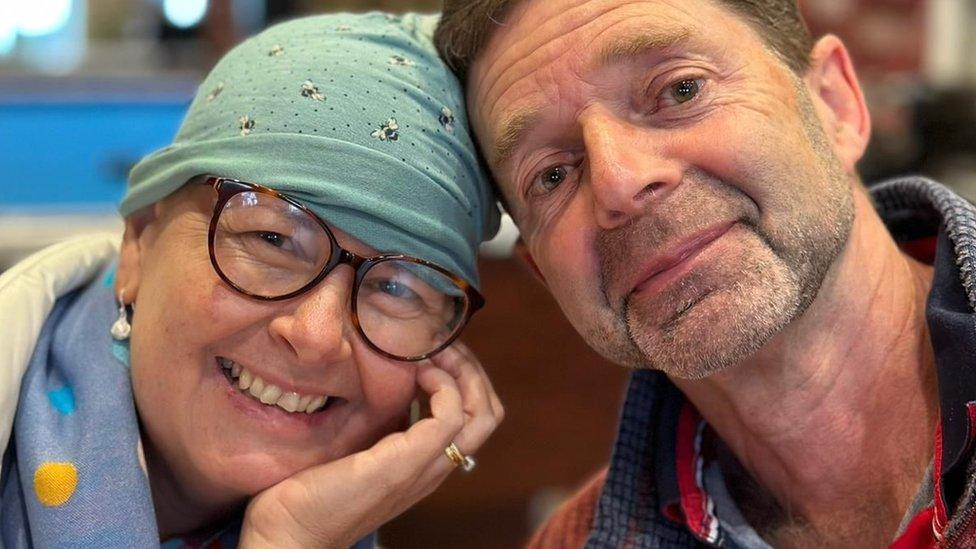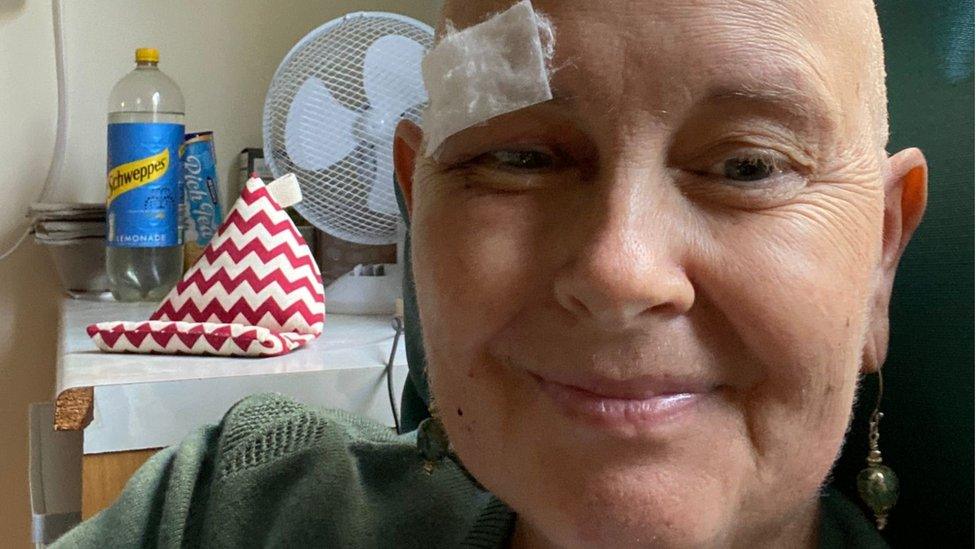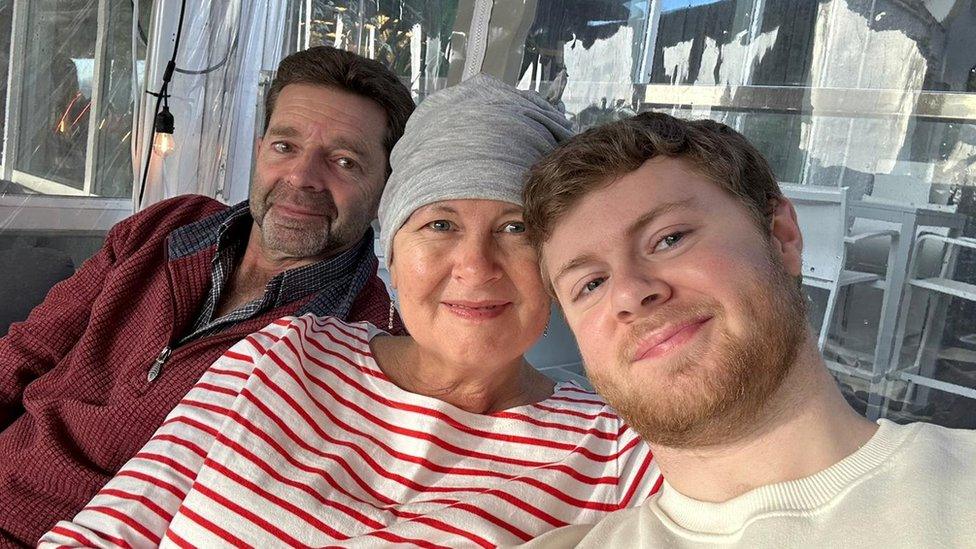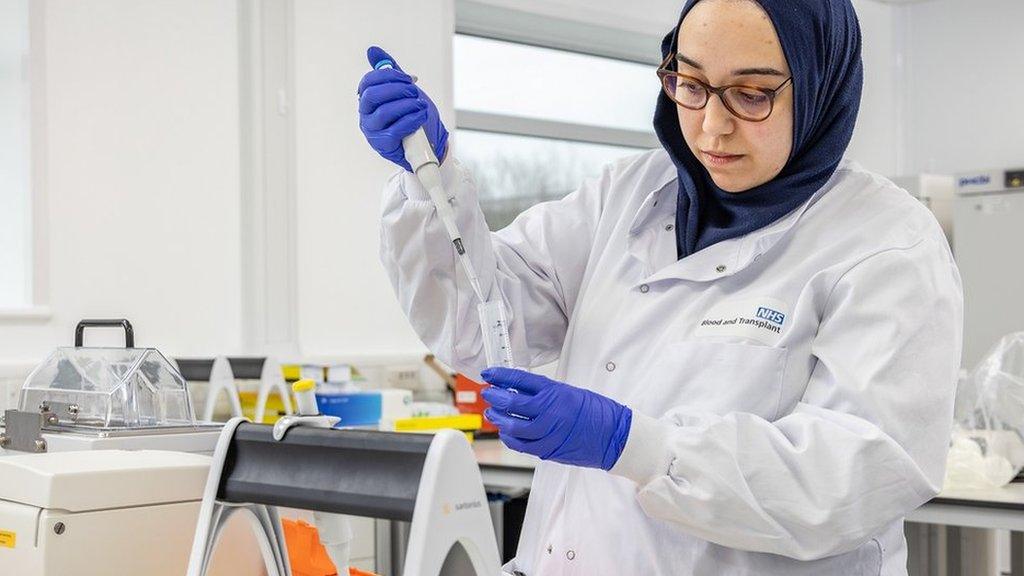Somerset woman highlights leukaemia's 'jigsaw symptoms'
- Published

Lisa Thompson was diagnosed with Acute Myeloid Leukaemia (AML) on 11 July last year
A primary school teacher is warning others to get the "jigsaw" of symptoms of leukaemia checked after she put her tiredness down to work.
Lisa Thompson said the initial symptoms can be "a nightmare to pin down", but encouraged people not to ignore them.
The 50-year-old, from Yeovil, said that during last summer she had "such overwhelming tiredness, sometimes if I knelt or squatted I couldn't get up".
Ms Thompson was speaking ahead of World Acute Myeloid Leukaemia (AML) day.
Leukaemia UK is raising awareness of AML which claims 2,600 lives each year in the UK.
Progress made in research over the past 40 years has increased the overall five-year survival rate for leukaemia from 13% to around 50% - but the five-year survival rate for AML has remained at 15.3%, despite being the second most common type of leukaemia.

Ms Thompson with her husband on holiday before she was diagnosed with AML
Ms Thompson had put her tiredness down to work and needing the summer break.
But in July 2022, she ended up feeling so unwell she asked her husband to take her to A&E.
"My symptoms included a bloodshot eye, sores and scabs all over my scalp that wouldn't clear up, pain in my right arm and shoulder, blood in my urine and a strange infection in the my left middle finger that made it swell and seemed to be spreading down into my hand," said Ms Thompson.

Common symptoms of AML
fatigue, bruising or bleeding, and repeated infections
feeling weak or breathless
fever or night sweats
bone or joint pain
Source: Leukaemia UK

"I felt worse and worse and eventually I called in sick to work on the Friday as I didn't feel safe to drive," she added.
"I tried to get to sleep Friday night but shortly after midnight I gave up and went into A&E."
Blood tests were taken which showed very low levels of red blood cells and MS Thompson was admitted to hospital and given a blood transfusion.

Ms Thompson said initial treatment started the day she was diagnosed to try and get the infections in her body under control
On the Monday morning Ms Thompson was told by a doctor that it was likely she had leukaemia and she was transferred to Musgrove Park Hospital in Taunton to the specialist haematology ward.
Ms Thompson was diagnosed with Acute Myeloid Leukaemia (AML) on 11 July last year.
She then received four courses of "effective but incredibly gruelling" chemotherapy over the next seven months.
She said initially the disease is "mind blowing... it's cancer, you know it can kill you and the sheer awfulness of the treatment is enormous".
"You don't expect to have to spend so much time in hospital... and you don't realise how draining that is for you and your family," she added.
"I regularly listened to a beautiful song called 'It's going to be okay' - it made me cry every time, but gave me hope."

Ms Thompson, pictured with her husband and son, recently finished her fourth chemotherapy course
Ms Thompson, who is now in remission, said she wanted to help others understand the "jigsaw" of symptoms people get with leukaemia and push for GPs to be "more proactive" in checking bloods.
AML, a type of blood cancer, can affect anyone but is most common in the over-60's, with more than 3,000 people in the UK diagnosed with the disease each year.
Chief Executive of Leukaemia UK, Fiona Hazell, said: "As with many diseases, earlier diagnosis improves the chances of successful treatment."
Leukaemia UK is urging people to be alert to the potential signs and symptoms of the disease and to visit their GP if they suspect something is wrong.

Follow BBC West on Facebook, external, Twitter, external and Instagram, external. Send your story ideas to: bristol@bbc.co.uk , external
- Attribution
- Published19 April 2023

- Published3 April 2023

- Published10 March 2023
